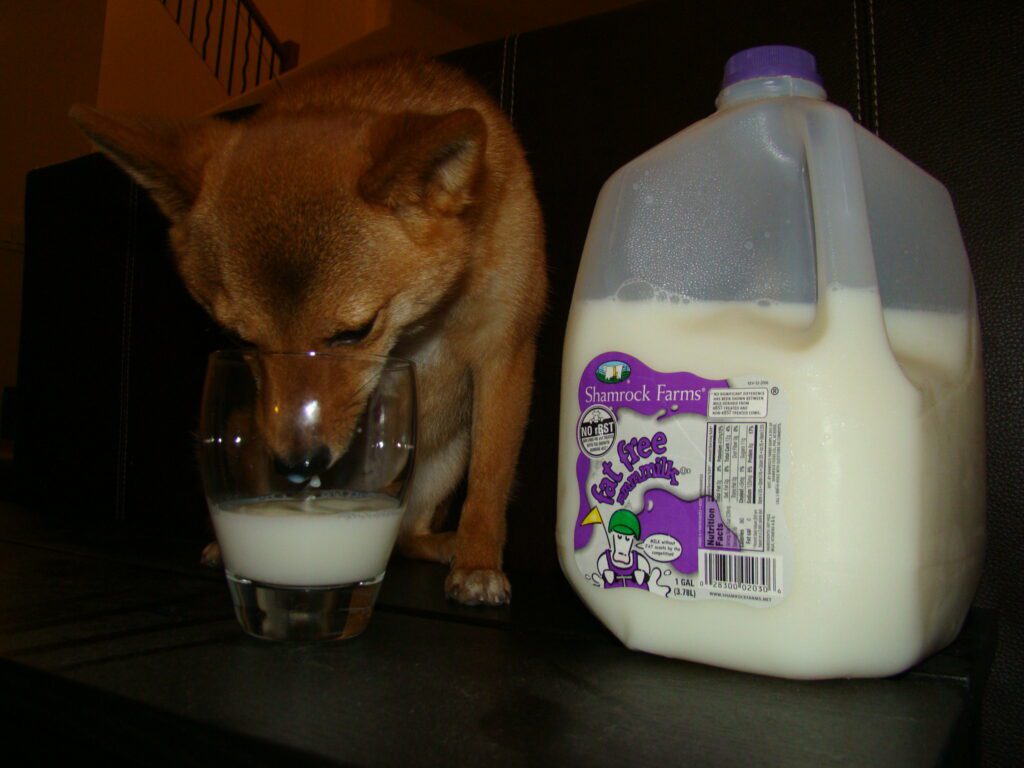If you’re a pet owner, you know how important it is to ensure that your puppies receive the best care possible.
For puppies with allergies or other health conditions that prevent them from nursing from their mother, selecting the right milk replacer becomes crucial to their well-being.
With so many options available on the market, it can be quite challenging to choose the best milk replacer for your furry friend.
In this guide, we will provide you with everything you need to know on how to choose the best milk replacer for puppies with allergies.
We’ll cover the key factors you should consider so that your puppy can thrive and develop into a healthy adult dog.
Causes of Milk Allergies in Puppies

Just like humans, puppies can also have milk allergies. When their immune systems consider milk proteins as harmful substances, they can trigger an allergic reaction. Here are some common causes of milk allergies in puppies:
Cow’s Milk
The most common cause of milk allergies in puppies is a reaction to the protein in cow’s milk. The main proteins in cow’s milk that can trigger an allergic reaction in puppies are whey and casein. These proteins can irritate the digestive system, leading to diarrhea, vomiting, and other symptoms.
Goat’s Milk
Apart from the protein in cow’s milk, some puppies may also be allergic to the protein in goat’s milk. While goat’s milk is a popular milk replacer compared to cow’s milk, it contains similar proteins that can cause allergies in puppies.
Soy Milk
Some puppies may be allergic to the protein in soy milk. While soy milk may be a good alternative, it is important to note that it may not be suitable for all puppies, especially those with soy allergies.
Early Weaning
Early weaning can also lead to milk allergies in puppies. Puppies need their mother’s milk to develop a strong immune system. Weaning too early can cause the puppy’s immune system to be weak and more susceptible to allergies.
Lack of Proper Nutrition
If a puppy is not receiving the proper nutrition from their current milk replacer, they can develop allergies. Puppies need a balanced diet of protein, carbohydrates, fat, and other nutrients to grow and develop properly.
Digestive Disorders
Puppies with digestive disorders such as inflammatory bowel disease or pancreatitis may be more prone to developing milk allergies. These disorders can damage the digestive system, making it more challenging for puppies to digest certain foods like milk replacers.
Mother’s Diet
In some cases, the mother’s diet during the nursing stage can also lead to milk allergies in her puppies. If the mother is fed cow’s milk or other milk replacers that contain allergenic proteins, their puppies may develop allergies too.
Understanding the causes of milk allergies in puppies can help you address the issue more effectively. It is important to consult with a veterinarian to properly diagnose and treat the allergy in your puppy.
Types of Milk Replacers For Puppies With Allergies

If your puppy has a milk allergy, it’s important to find an alternative milk replacer that won’t cause any allergic reactions.
Here are some common types of milk replacers for puppies with allergies:
Goat’s Milk Replacer
Goat’s milk replacer is an excellent option for puppies with cow’s milk allergies. It is gentle on their digestive system and contains less lactose than cow’s milk, making it easier for puppies to digest.
Additionally, goat’s milk is rich in vitamins and minerals, making it a nutritious choice for puppies.
Soy Milk Replacer
A soy milk replacer is another option for puppies with milk allergies. Soy milk is made from soy protein and typically doesn’t contain the same proteins as cow’s milk.
However, it’s important to note that some puppies may also be allergic to soy, so it’s important to consult with a veterinarian before using a soy milk replacer.
Coconut Milk Replacer
Coconut milk is another great alternative for puppies with milk allergies. It’s rich in nutrients like iron and magnesium, and the fat content is easily digestible.
Coconut milk also contains lauric acid, which has antibacterial and antiviral properties that can help maintain healthy gut bacteria in puppies.
Almond Milk Replacer
Almond milk is a non-dairy milk replacer made from ground almonds and water. It’s low in fat, high in protein, and doesn’t contain the same proteins as cow’s milk.
However, like soy milk replacers, it’s important to note that some puppies may also be allergic to almonds.
Homemade Milk Replacers
Homemade milk replacers can also be an alternative for puppies with allergies. This may include recipes made from ingredients like eggs, water, and yogurt.
However, it’s important to note that homemade milk replacers may not provide the necessary nutritional balance that puppies need and should only be used after consulting with a veterinarian.
As with any dietary change, it’s important to consult with a veterinarian before giving any new milk replacement to your puppy. They can help you choose the best option and ensure your puppy is receiving all the necessary nutrition to keep them healthy.
How to Choose the Best Milk Replacer for Puppies with Allergies
Choosing the right milk replacer for your puppy with allergies can be a bit challenging. Here are some factors to consider when selecting the best milk replacer for your puppy:
Ingredients
The ingredients in the milk replacer are one of the most important factors to consider. It’s crucial to avoid milk replacers that contain allergenic proteins such as cow’s milk or soy if your puppy has allergies.
Goat’s milk, coconut milk, and almond milk are excellent alternatives that are gentle on the digestive system and are less likely to cause allergic reactions.
Nutritional Content
It’s important to choose a milk replacer that provides all the necessary nutritional content your puppy needs to grow and develop properly. Milk replacers that contain essential nutrients like protein, carbohydrates, fat, vitamins, and minerals are essential for your puppy’s growth and development.
Taste and Smell
Puppies can be picky eaters, and the smell and taste of the milk replacer can play a significant role in their willingness to consume it. It’s crucial to select a milk replacer that has a palatable taste and smell that your puppy will enjoy.
Brand and Reviews
Not all milk replacer brands are the same, so it’s important to do your research and choose a reputable brand. Reading reviews from other pet owners who have used the product can give you an idea of how well it works, or if there are any potential issues to be aware of.
Allergy Diagnosis
Before choosing a milk replacer, it’s important to determine the specific allergy your puppy has. Taking your puppy to the veterinarian to undergo allergy testing can provide important insights into what type of milk replacer will be the most suitable for your puppy.
Choosing the best milk replacer for your puppy with allergies is essential to their well-being. By considering these factors, you can choose a milk replacer that provides all the necessary nutrition without causing any allergic reactions.
Tips For Feeding Milk Replacer To Puppies With Allergies
Feeding milk replacers to puppies with allergies can be challenging.
Here are some tips to ensure your puppy is getting the nutrition they need without any allergic reactions:
Introduce The Milk Replacer Slowly
Introduce the milk replacer slowly to your puppy’s diet. Start by adding a small amount to their regular food and gradually increase the amount over time. This allows your puppy to adjust to the new taste and smell of the milk replacer.
Mix In Probiotics
Adding probiotics to your puppy’s diet can help maintain a healthy gut and reduce the risk of digestive problems. Probiotics can be added to the milk replacer or mixed in with their regular food.
Monitor Your Puppy’s Reaction
Monitor your puppy’s reaction to the milk replacer closely. Watch for any signs of allergic reactions like vomiting, diarrhea, or skin irritation. If you notice any symptoms, stop using the milk replacer immediately and consult with a veterinarian.
Follow The Feeding Instructions
Each milk replacer brand will have specific feeding instructions based on the age and weight of your puppy. Follow the instructions carefully to ensure your puppy is receiving the appropriate amount of nutrition.
Use The Right Equipment
Using the right equipment to feed your puppy can make a big difference. Use a bottle designed specifically for puppies and make sure that the nipple is in good condition. This will make it easier for your puppy to feed and reduce the risk of digestive problems.
Consult With A Veterinarian
Consulting with a veterinarian before feeding your puppy a milk replacer is essential, especially if your puppy has allergies. They can help you choose the right milk replacer and provide guidelines for feeding and monitoring your puppy’s health.
Feeding a puppy with allergies requires extra care and attention, but by following these tips and guidelines, you can ensure your puppy is getting the nutrition they need without any negative health effects.
Common Concerns When Using Milk Replacer For Puppies
Using milk replacers for puppies with allergies can come with some concerns.
Here are some of the most common concerns when using milk replacers for puppies:
Digestive Issues
One of the most common concerns when using milk replacers for puppies is digestive upset. Puppies may experience diarrhea or constipation if they are not tolerating the milk replacer well.
Picky Eaters
Puppies can be picky when it comes to their food, and milk replacers may not always have the most palatable taste. Some puppies may not be willing to drink the milk replacer or may take some time to adjust to the new taste.
Nutrition
Ensuring that your puppy is getting the appropriate nutrition from the milk replacer can be a concern. Milk replacers may not always contain the same level of protein, fat, and other nutrients as mother’s milk.
Allergic Reactions
Puppies with allergies may be at risk of developing allergic reactions to the milk replacer they are given. It’s important to choose a milk replacer that’s free from allergenic proteins like cow’s milk or soy.
Health Issues
Puppies with pre-existing health conditions like diabetes or kidney disease may need a specially formulated milk replacer. It’s important to consult with a veterinarian before giving your puppy any new type of milk replacer.
Overfeeding
Overfeeding with milk replacers can cause weight gain and other health problems. It’s important to follow the feeding instructions provided by the milk replacer brand and adjust according to your puppy’s individual needs.
By being aware of these common concerns, you can use milk replacers for puppies with allergies safely and effectively. It’s important to consult with a veterinarian if you have any concerns about your puppy’s health or nutrition.
In Conclusion
Feeding your puppy with allergies the right milk replacer is essential to their well-being. With so many options available on the market, it can be challenging to navigate and choose the best one.
However, by taking into account factors like ingredients, nutritional content, taste, and overall health considerations for your puppy, you can select the best milk replacer.
Goat’s milk, coconut milk, almond milk, and soy milk are some popular and effective alternatives to cow’s milk. It’s important to consult with a veterinarian and choose a reputable brand of milk replacer to ensure your puppy is getting the necessary nutrition and avoiding any potential harmful effects.
By following the tips and guidelines provided in this guide, you can help your puppy with allergies grow and develop into a healthy adult dog.





Leave a Reply